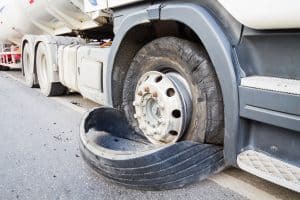Hot-Weather Tire Blowouts and Truck Crashes Around Kansas City
 Summer in Kansas City, with long stretches of hot and dry weather, means more than just barbecues and baseball. It also means a greater risk on our roadways, especially for commercial trucks and unsuspecting drivers nearby. One of the biggest hazards is tire blowouts caused by heat. When a large truck’s tire fails at highway speed, the results can be devastating for everyone involved.
Summer in Kansas City, with long stretches of hot and dry weather, means more than just barbecues and baseball. It also means a greater risk on our roadways, especially for commercial trucks and unsuspecting drivers nearby. One of the biggest hazards is tire blowouts caused by heat. When a large truck’s tire fails at highway speed, the results can be devastating for everyone involved.
What is a tire blowout, and why does heat make it worse?
A tire blowout is “when a tire suddenly loses pressure, causing it to ‘burst’ or ‘explode.’ This process can cause the vehicle to lose control. In many cases, the tire’s tread will detach, and the rubber will separate, leaving behind an unrecognizable, damaged tire.” On big trucks, like 18-wheelers, semis, etc., this can be extra frightening. These vehicles are massive, and the forces involved are magnified many times over. Heat contributes heavily to blowouts for several reasons:
- Air pressure inside the tire expands as temperatures rise. That means a tire that might have been within safe pressure limits when it was cooler can become overpressurized in the heat, increasing stress on the tire sidewalls and tread.
- Low tire pressure (underinflation) is another common culprit. If a tire starts out underinflated and you drive in the heat, it flexes more, heats up more, and is more likely to fail.
- Worn treads, cracks, bulges, or weak areas in the tire’s construction are more likely to give way when heat makes everything more fragile.
- Heavy loads only make things worse. Because truck tires must carry big loads, when you combine hot asphalt, heavy weight, underinflation, and long highway runs, the chances of a blowout rise steeply.
Here in Kansas City, where summer highs often climb into the 90s or more, and pavement temperatures can be much hotter, these factors combine. Trucks often travel long distances in these conditions, sometimes without adequate rest or maintenance.
How do tire blowouts cause truck crashes?
A tire blowing out on a commercial truck isn’t like getting a flat on a sedan. The sequence of events is usually fast, chaotic, and difficult to control. Here’s what often happens:
- Sudden loss of air pressure. The blowout may be at the steer tire (the front), on a drive axle, or on a trailer tire. Each location has different effects. For example, a steer tire blowout tends to pull the truck sharply to one side, making it hard to keep control. A blowout on a drive axle or trailer tire might lead to fishtailing or sway. If multiple tires are compromised, the effects stack onto each other.
- Lengthy stopping distance and limited maneuverability. Heavy trucks need much more room to stop, and a blowout can mean that the driver has less ability to safely brake. Combined with high speeds on the road in hot weather, brakes may already be stressed.
- Jackknife or rollovers. These are common results of blowouts, especially if a trailer swings outward or if the driver overcorrects while trying to maintain control of the vehicle. A truck that swerves, spins, or loses a tire balance can roll over or jackknife. These accidents are destructive, often involving multiple lanes and sometimes multiple vehicles.
- Debris and secondary hazards. When tires blow out on trucks, they often shed large pieces of rubber (tread separation), or the blown tire fragment becomes debris on the road. That debris can cause hazards for other vehicles, causing other car crashes or making people swerve dangerously.
- Heat-driven failures. High road surface temperatures degrade tire materials more quickly. Inside tire components, like rubber, belts, and steel, can weaken under repeated heat cycles. Weak sidewalls or old tires are more likely to fail under these conditions.
Who is responsible for a truck accident caused by a tire blowout?
Proving who is legally responsible for your injuries and losses after a truck accident caused by a tire blowout can be complicated, but there are several potential parties to look at.
- The truck driver is responsible for pre-trip inspections, checking tire pressure and conditions, noting any visible damage, and ensuring safe operation while driving. If the driver ignored warnings, failed to check tire pressure, or knowingly continued driving with worn or damaged tires, the driver can be held personally liable for the accident. Further, the driver’s speed and how they reacted to the blowout can come into play here, especially if overcorrection or sudden maneuvers worsened the crash. It’s important to remember that a blowout can leave very little time to react.
- The trucking company that owns the commercial vehicle has a duty to maintain its fleet. This includes routine checks, replacing worn tires, making sure the proper parts are used, and respecting federal and state safety regulations. If the trucking company punishes delays or doesn’t provide enough time for maintenance, or cuts corners on inspections, that can be considered negligence.
- Sometimes the party responsible for inspecting or replacing tires is a third-party shop. If they misidentify damage, fail to install the correct tire, overinflate, underinflate, or use poor-quality parts, they may also share liability.
- If there’s a defect in how the tire was made, like poor bonding of belts, materials prone to failure in the heat, or structural defects, the tire manufacturer might be responsible in a product liability This sometimes requires a recall history or expert testimony.
- Overloading or uneven cargo that causes one side of the trailer to bear more weight can stress specific tires and increase the risk of blowouts. Improper load securement is a known factor in many truck accidents.
- Sometimes, road conditions like debris, asphalt damage, or potholes damage tires, contributing to or causing In Missouri and Kansas, claims against road services are generally limited by sovereign immunity, but exceptions exist for dangerous conditions of public property or negligent operation of public vehicles.
Injury risks in hot-weather tire blowout truck accidents
When a tire blowout causes a truck accident, injuries are often severe due to the truck’s size and speed. Some common injury risks include:
- Blunt force trauma from the impact, including head injuries, internal bleeding, and organ damage.
- Crush injuries, if the truck rolls over or jackknifes.
- Spinal cord injury or paralysis, especially if the victim is thrown from their vehicle or hit by heavy parts.
- Bone fractures, severe lacerations from debris, burns (if there’s fire), and disfigurement.
- Fatalities, especially in head-on crashes or rollovers.
Other factors that can make injuries worse include:
- The speed of the truck at the moment of blowout
- Whether other vehicles were involved
- Road conditions (if the pavement is slippery, hilly, etc.)
- Whether the victim was properly restrained (in cars) or protective gear was worn (in motorcycles or small vehicles)
What should I do after a truck accident caused by a tire blowout?
If you or a loved one suffers injury because a truck had a tire blowout, the following actions can help build a strong case.
- Seek immediate medical attention. Your health should be your top priority. Further, medical records document your injuries, which will matter when determining damages.
- Call law enforcement and get an accident report from the responding officer. This helps establish what happened.
- Photograph the scene, the truck, the damaged tire, the tire tread, debris, and skid marks. If you can, get information about the truck, including the license number, company name, and DOT number.
- Talk to an experienced truck accident lawyer. These types of cases can be complex, as multiple parties may be liable (the driver, company, manufacturer, maintenance provider, and even government agencies).
How can a Kansas City truck accident lawyer help with my case?
At Kansas City Accident Injury Attorneys, we’ve handled many truck accidents, including hot-weather tire blowouts. We offer help in these ways:
- Conducting detailed investigations into tire condition, truck maintenance, and company policies.
- Working with experts to show how heat, load, tire pressure, or defective components caused or contributed to the blowout.
- Gathering evidence from truck inspection logs to tire maintenance or replacement records, and pre-trip inspection reports.
- Identifying all potentially liable parties beyond just the driver.
- Handling insurance claims, litigation, and pursuing damages for medical bills, lost income, pain and suffering, and more.
What truckers and companies can do to reduce tire blowout risks
If you’re involved in trucking, whether as a driver, owner, or company, here are the best practices to reduce hot-weather blowouts:
- Check tire pressure frequently, especially before long highway drives in the Adjust based on load and environment.
- Replace tires at age, not just tread wear. Even tires with decent tread can be compromised by age, cracks, or heat cycles.
- Follow weight limits strictly. Don’t overload. Distribute the load so no one tire has an excessive burden.
- Maintain tires properly: rotate them, inspect sidewalls, and replace worn or damaged tires before failure becomes imminent.
- Implement and enforce regular inspection routines as FMCSA requires: pre-trip safety checks, post-trip reporting, periodic inspections and maintenance.
- Consider equipping trucks with tire pressure monitoring systems (TPMS) and temperature sensors, if possible.
- Train drivers to recognize early signs of tire trouble: vibration, heat, visible damage.
Hot weather isn’t just uncomfortable. It’s dangerous when combined with mechanical neglect. For large trucks, the stakes are high: a blown tire in the heat can lead to catastrophic loss of control, massive property damage, injury, or death. If you live in or drive around Kansas City, here are the two biggest takeaways:
- For commercial operators: don’t wait. Tire maintenance in heat is non-negotiable. Checks, records, replacements; upfront work can prevent disaster.
- For individuals who’ve been hurt: take action quickly. The stronger and more immediate your evidence, the better your chance of proving liability and getting fair compensation.
Tire blowouts in hot weather are a serious cause of truck accidents, and they often lead to long-term harm. The law imposes high standards of care for trucking companies, drivers, and maintenance providers, standards meant to prevent exactly this kind of disaster. When those standards are ignored, victims pay the price. If you or someone you know has been involved in a truck accident in Kansas City that may have been caused by a tire blowout, contact Kansas City Accident Injury Attorneys. We can help you understand your rights, investigate what really happened, and fight to make sure those responsible are held accountable. Get in touch with us today by calling our offices for a free consultation or filling out our contact form.

We know that it can feel as if there’s no end in sight when you’re living with a serious injury. At Kansas City Accident Injury Attorneys, we’re on your side from day one. We’ll not only fight for your best interests, but we’ll help you process and deal with your injury along the way. Our personal injury lawyers handle the insurance company for you, and make sure that you find the tools and resources you need to move forward. When you need an experienced, compassionate Kansas City personal injury lawyer, we answer the call.

